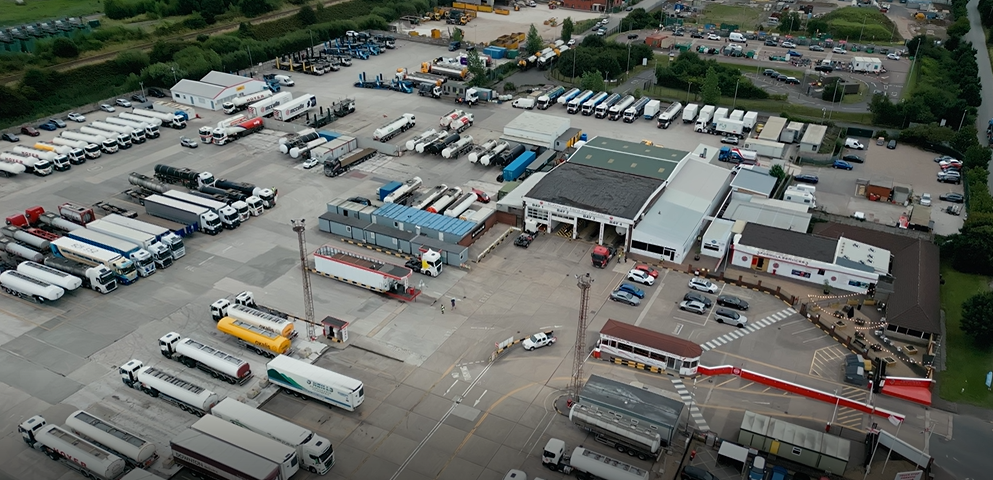
Susie Jones
Como pode o sector dos transportes apoiar a saúde mental dos motoristas?
Criado: 07/10/2024
•
Atualizado: 10/10/2024
44% dos condutores de camiões de longo curso apresentam sintomas de depressão - no entanto, a saúde mental no sector dos transportes é frequentemente negligenciada. A natureza do trabalho desempenha um papel fundamental no bem-estar dos condutores, que enfrentam longas horas na estrada e períodos de isolamento prolongados. Com o Dia da Consciencialização para a Saúde Mental a 10 de outubro, como podem os condutores e a indústria cuidar do seu bem-estar?
Como é que os condutores podem cuidar da sua saúde mental?
Os condutores podem tomar várias medidas para garantir que cuidam da sua saúde mental:
Dormir e descansar
Um sono adequado é vital para a saúde física e mental. Como camionista, as longas horas ao volante podem perturbar um padrão de sono regular - estabelecer uma rotina melhorará o humor, o estado de alerta e o bem-estar do condutor.
Hidratação e dieta
Embora seja difícil na estrada, manter uma dieta equilibrada e manter-se hidratado é fundamental para evitar quebras de energia e alterações de humor.
Gerir o stress
Parte da profissão de motorista de veículos pesados é gerir situações de stress - técnicas de gestão do stress, como a gestão do tempo e exercícios de relaxamento, reduzem eficazmente os níveis de stress. Praticar a atenção plena, como a meditação e a respiração profunda, ajuda a manter uma mentalidade calma.
Exercício físico
O exercício regular é essencial para a saúde física e mental. Exercícios simples como caminhar, andar de bicicleta ou fazer alongamentos libertam endorfinas e melhoram o humor. Descubra [como manter-se saudável na estrada] (https://snapacc.com/newsroom/how-to-be-a-healthy-truck-driver/).
Falar
A condução de camiões é um trabalho isolado em que os condutores passam horas sem falar com ninguém. Manter-se ligado a amigos, familiares e colegas através de chamadas telefónicas e chats de vídeo proporciona apoio e combate os sentimentos de solidão. As paragens de camiões oferecem uma grande oportunidade para os condutores falarem com pessoas que pensam da mesma forma sobre as provações e tribulações do trabalho.
Fazer pausas
Estar ao volante durante longos períodos de tempo pode ser mentalmente desgastante - fazer pausas regulares para descansar e recarregar reduz os níveis de stress. Os condutores estão sujeitos a regulamentos rigorosos relativamente a pausas regulares - saiba mais sobre [regras e regulamentos do tacógrafo] (https://snapacc.com/newsroom/tachograph-rules-made-easy/).
O que os condutores disseram
Nas redes sociais, pedimos aos condutores que nos dissessem como cuidam da sua saúde mental:
A Truck Life GB afirma que "apoia outros condutores através das minhas plataformas de redes sociais. A minha caixa de correio está sempre aberta para uma conversa. Quer se trate de um pouco de brincadeira ou de uma conversa geral, são as pequenas coisas que fazem toda a diferença."
"Podcasts e um grande grupo de amigos que conhecem todos os altos e baixos, tal como eu conheço os deles. Pelo menos um deles estará a ter um dia pior do que o seu", explica o camionista Mark.
O serviço de texto ["Be A Mate"] (https://www.matesinmind.org/training-and-resources/be-a-mate-text-service) da [Mates in Mind] (https://www.matesinmind.org/) permite que os condutores falem com voluntários formados, 24 horas por dia, 7 dias por semana, caso se sintam suicidas, ansiosos ou sobrecarregados. O serviço é anónimo e não aparece nas contas telefónicas. Tudo o que os condutores precisam de fazer é testar "BeAMate" para 85258 para iniciar a conversa.

O que é que as empresas de frotas podem fazer?
Os gestores de frotas podem adotar várias medidas para garantir que os seus condutores cuidam da sua saúde mental. Promover um ambiente em que as discussões em torno da saúde mental sejam abordadas abertamente e sem juízos de valor pode mudar opiniões e estigmas.
As frotas podem adotar as seguintes medidas:
Carga de trabalho
Sempre que possível, a redução da carga de trabalho do condutor pode melhorar significativamente o seu bem-estar.
Apoio
A comunicação regular com os condutores encorajará conversas honestas. Fornecer aos condutores um sistema de apoio assegurará que não se sintam sozinhos.
Comunicação
Comunicar eficazmente sobre quaisquer mudanças organizacionais reduzirá os níveis de stress entre os condutores.
Cultura
Promover uma cultura de trabalho positiva que evite conflitos e comportamentos inaceitáveis.
O que podem as paragens de camiões fazer para ajudar a saúde mental dos motoristas?
Os condutores de camiões dependem das paragens de camiões para as suas necessidades básicas diárias. Estas são cruciais para melhorar a saúde mental dos condutores, uma vez que actuam como um refúgio para os condutores que passaram longas horas isolados ao volante. A oferta de instalações limpas de última geração, opções alimentares saudáveis e um local para socializar permite aos condutores relaxar e descontrair.
As paragens de camiões podem incentivar a comunidade, organizando actividades e eventos sociais em que os condutores possam estabelecer contacto com os seus pares e aliviar os sentimentos de isolamento.
Como é que a escassez de condutores afectou a saúde mental dos condutores?
A partir de 2023, a Europa terá mais de 230.000 vagas de motoristas de camião por preencher - uma escassez desta dimensão aumentou a pressão sobre os que já estão no sector.
O aumento do comércio eletrónico veio aumentar esta pressão - os condutores de camiões têm de cumprir prazos de entrega mais apertados e lidar com volumes mais elevados de mercadorias. O aumento da carga de trabalho e as pressões acrescidas tiveram um impacto significativo no bem-estar dos condutores, com as taxas de rotação dos trabalhadores a atingirem os valores mais elevados.



